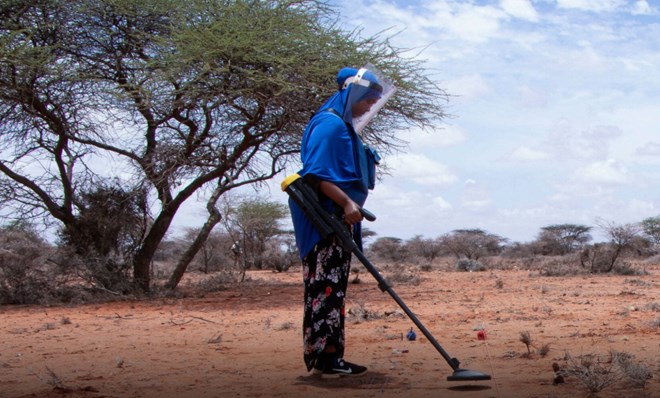
Sunday January 9, 2022

A long-running project to clear two districts – Dhabad and Galdogob – of landmines in northern Somalia finished last month (December), leaving millions of square metres of land mine free and safe for local residents to use.
Funded by the European Union (EU) and implemented by the United Nations Mine Action Service (UNMAS) with support from the HALO Trust, the ‘community-based mine action as a means to promote peace and stability in Somalia’ project ran from October 2020 to December 2021.
The now safe to use land is in Somalia’s Galmadug and Puntland provinces.
“Implemented by comunity-based teams with EU funding, the explosive hazard threat was systematically reduced to enable safe land use previously not possible,” director-general of the Somali Explosives Management Agency (SEMA), Dahir Abdirahman Abdulle, said.
Working with implementing partner the HALO Trust, UNMAS implemented systematic clearance of minefields and confirmed hazardous areas in the districts, while detecting and destroying landmines and unexploded ordnance. Altogether more than half a million square metres of land containing minefields and an additional three million square metres of land previously used as battle areas were made safe for local residents.
The project provided employment for 113 local community members, bringing a new source of income and fostering a sense of ownership of the solution to the landmine problem. It helped reduce the propensity of local young men and women to engage in activities possibly leading to further insecurity.
“The people of these districts can now hope for a better future, for children to return safely from school, livestock to graze freely, businesses to start up again and have once bustling commerce between villages restored. A sense of normal life can return with economic opportunities and daily activities possible by reduced exposure to insecurity – the EU is proud to have been part of this project,” EU regional programme manager for the EU delegation in Kenya, Steven De Vriendt, said.
Communities in Dhabad and Galdogob were provided with explosive ordnance risk education to enhance safety awareness, with at least twelve thousand people educated. Additionally, 650 risk education talking devices embedded with awareness messages were distributed in the communities.